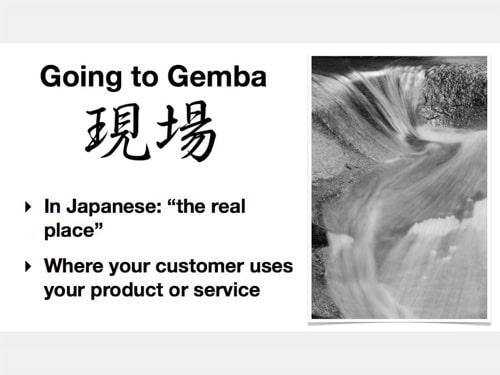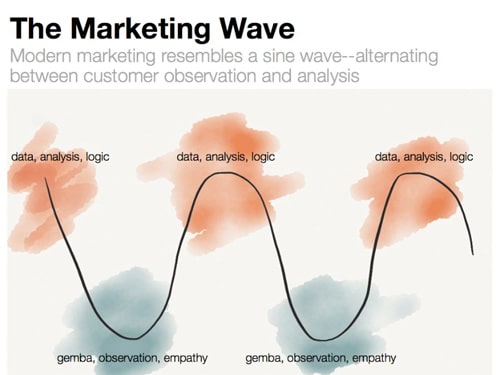Gemba is a Japanese term meaning “the real place.” It means the place where things happen. So, in police work, gemba is the crime scene. In the case of manufacturing, it’s the factory floor. And, in the case of your customers, it’s where they interact with you and use your product or service.

Companies have lots of data about their customers. They have purchase data, research, segmentation, customer feedback, multiple listening posts, etc. Most business leaders I speak with believe they know a lot about their customers. However, in my experience, that’s rarely the case. Most companies have a cloudy picture at best of their customer’s wants and needs, their experiences, and their similarities and differences.
Going to gemba means getting out of your office and sometimes getting out of your comfort zone. It means talking directly with your customers. Observing them as they use your product or service. Asking questions. Watching and listening so that you create empathy with your customers.
Last year, I heard the designer Deborah Adler speak at a TEDx conference. Deborah described her work partnering with Target to create the ClearRx prescription packaging system. She spent lots of time watching and observing people as they interacted with their prescriptions. She noticed that some elderly couples were prescribed the same medicine but in different doses. As you might imagine, mixups were common. Deborah used her insights gleaned from going to gemba to design something much better. Deborah created a new prescription package that is much easier to read and color coded for each person in the family. The results were remarkable, and illustrate how small changes can have a big impact.
The best approach to modern marketing may look something like a sine wave. Going deep into gemba to observe the customer and coming back up into the data to explore the hypotheses generated by observation. The wave repeats with the continuing dance between empathy and logic. This is the best way to get the most out of the volumes of data and analytical horsepower now available.

If you aren’t thinking about all the interactions customers have with your company, all their touch points, and all of their experiences using your products and services, you’re missing a tremendous opportunity. By thinking of these interactions and experiences and by going to gemba, to observe and listen to customers, your company may also be able to identify some small changes that can have a big impact. Modern marketing doesn’t just require data and analysis. It requires empathy and understanding as well in order to create results that truly matter.




